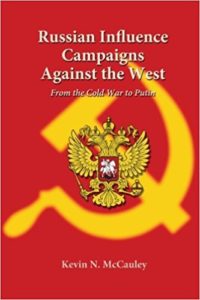 Russia must face far stronger consequences for its electoral interference and disinformation operations, according to Philip Gordon and Robert Blackwill, senior fellows at the Council on Foreign Relations and veterans of the Obama and Bush administrations, respectively. The new U.S. National Security Strategy concludes that “actors such as Russia are using information tools in an attempt to undermine the legitimacy of democracies” and that “Russia challenge[s] American power, influence, and interests,” they write in Foreign Affairs:
Russia must face far stronger consequences for its electoral interference and disinformation operations, according to Philip Gordon and Robert Blackwill, senior fellows at the Council on Foreign Relations and veterans of the Obama and Bush administrations, respectively. The new U.S. National Security Strategy concludes that “actors such as Russia are using information tools in an attempt to undermine the legitimacy of democracies” and that “Russia challenge[s] American power, influence, and interests,” they write in Foreign Affairs:
Nongovernmental efforts will also have to be part of the solution. Major social media platforms should sign on to a voluntary code of conduct that commits them to more actively policing their networks for disinformation, false news stories, botnets, and false-flag advertising—identifying, labeling, and, where appropriate, blocking them. …Bipartisan institutions—such as the  German Marshall Fund’s Alliance for Securing Democracy, which tracks Russian propaganda efforts—can also help identify and combat disinformation. Selective declassification of evidence of Russian interference could bolster such efforts.
German Marshall Fund’s Alliance for Securing Democracy, which tracks Russian propaganda efforts—can also help identify and combat disinformation. Selective declassification of evidence of Russian interference could bolster such efforts.
Russia’s influence operations are only accelerating. As its tools and tactics evolve, the U.S. must catch up or be left vulnerable to more, perhaps worse, interference in the 2018 and 2020 elections, argues Alina Polyakova, the David M. Rubenstein Fellow for Foreign Policy at the Brookings Institution.
 This week’s report documenting Russia’s “Asymmetric Assault on Democracy” argued that “social media companies should redouble efforts to prevent, detect, and delete [malicious inauthentic and/or automated] accounts, especially those that are primarily used to promote false news stories” (emphasis added), notes Harvard Law School’s Evelyn Douek. But this recommendation raises more questions than it answers,. How to account for freedom of speech concerns is the single most difficult issue in the disinformation quagmire, she writes for Lawfare:
This week’s report documenting Russia’s “Asymmetric Assault on Democracy” argued that “social media companies should redouble efforts to prevent, detect, and delete [malicious inauthentic and/or automated] accounts, especially those that are primarily used to promote false news stories” (emphasis added), notes Harvard Law School’s Evelyn Douek. But this recommendation raises more questions than it answers,. How to account for freedom of speech concerns is the single most difficult issue in the disinformation quagmire, she writes for Lawfare:
As the report itself notes, this is what makes democracies asymmetrically vulnerable to such information operations—their robust commitment to free and open debate. Furthermore, the general exhortation to respect free speech concerns fails to identify what kind of free speech concerns the report thinks the U.S. government should champion. America has historically shown a strong commitment to First Amendment exceptionalism that requires much broader protections for speech than other jurisdictions have. Is it this wider understanding of free speech that social media companies should take into account? Or the more circumscribed understanding of protected speech that exists in the other jurisdictions that they (and Russian propagandists) operate?
 The term dezinformatsiya — disinformation — was coined by Joseph Stalin, notes Jason Rosenbaum, a media consultant and founder of Seward Square Strategies. We know the Kremlin’s playbook. And we know there are vulnerabilities in our media infrastructure.
The term dezinformatsiya — disinformation — was coined by Joseph Stalin, notes Jason Rosenbaum, a media consultant and founder of Seward Square Strategies. We know the Kremlin’s playbook. And we know there are vulnerabilities in our media infrastructure.
There is no simple way to prevent these attacks and at the same time protect the internet’s promise of open access to information and our basic right to free speech. But a handful of tactics, employed now, would help, he writes for The LA Times:
- Disclose the source of political advertising. The most obvious way to inject transparency into political influence is to know who’s paying for political ads and how much they are spending. Paid digital advertising provides powerful targeting opportunities, allowing bad actors to use data to reach citizens most susceptible to disinformation efforts. Disclosure has been the norm for political advertising in other media for years.
- Eliminate automated internet account activity. Automated accounts on platforms like Twitter are one of the most common vectors for propagating disinformation. The accounts appear to be operated by legitimate users, but they are actually operated by machines or by groups and individuals using fake identities. Technology platforms can’t prevent the creation of false identities in every situation, but they can and must shutter the automated accounts.
 Create a bipartisan, independent commission to explore next-generation safeguards. Disinformation attacks by foreign adversaries will grow more sophisticated in coming years, yet we do not have a forward-looking body to assess and mitigate future threats.
Create a bipartisan, independent commission to explore next-generation safeguards. Disinformation attacks by foreign adversaries will grow more sophisticated in coming years, yet we do not have a forward-looking body to assess and mitigate future threats.
- Reestablish standards for truth in media. The current media and political environment has blurred the differences between lies and truth, opinion and verifiable information, allowing exploitation by enemies of democracy. Counterintelligence expert Clint Watts argued before the Senate Intelligence Committee in favor of a nonprofit, non-governmental “Consumer Reports”-style organization that would provide “nutrition labels” for information outlets. The goal would be to better identify fact versus fiction and reporting versus editorializing in media.
 The current media war between Russia and the West looks like a caricature of the ideological struggle between communism and liberal democracy in the middle of the 20th century, argues analyst Andrey Kortunov. Nor can Russia be isolated from the West in an age of unprecedented human mobility, porous borders, global information and communications technologies, he writes in Russia’s Changing Relations with the West: Prospects for a New Hybrid System, a chapter in The Russia File, Daniel S. Hamilton and Stefan Meister (editors). Despite all of Russia’s efforts aimed at self-reliance, import substitution and higher protectionism, the country’s dependence on the outside word is likely to increase, not decrease.
The current media war between Russia and the West looks like a caricature of the ideological struggle between communism and liberal democracy in the middle of the 20th century, argues analyst Andrey Kortunov. Nor can Russia be isolated from the West in an age of unprecedented human mobility, porous borders, global information and communications technologies, he writes in Russia’s Changing Relations with the West: Prospects for a New Hybrid System, a chapter in The Russia File, Daniel S. Hamilton and Stefan Meister (editors). Despite all of Russia’s efforts aimed at self-reliance, import substitution and higher protectionism, the country’s dependence on the outside word is likely to increase, not decrease.
“Russia In The World” is a MEMRI Russian Media Studies Project review of Russia’s geopolitical interests and areas of penetration. This installment deals with accusations that Russia is meddling in the Italian political process by supporting two Euroskeptic parties – the nationalist Northern League [Lega Nord] and the populist Five Star Movement – in Italy’s upcoming parliamentary elections. RTWT
 The never ending moral decay of the West is one of the recurring narratives in the pro-Kremlin disinformation wardrobe, the EU East StratCom Task Force’s Disinformation Review notes:
The never ending moral decay of the West is one of the recurring narratives in the pro-Kremlin disinformation wardrobe, the EU East StratCom Task Force’s Disinformation Review notes:
- In the Georgian disinformation space, the moral decay of the West was supposedly illustrated by a new Canadian law that made criticising gender theory a criminal offence. In reality, the new law is an amendment to the Canadian Human Rights Act, which adds gender identity and gender expression to the list of prohibited grounds of discrimination.
- On Russian state TV, NATO was claimed to be on par with Daesh when it comes to terrorism. And the US was accused of being one of the warring sides in Ukraine. We have debunked such claims countless times.
- A new US report was claimed on Russian state TV to be Russophobia, another common excuse used by pro-Kremlin disinformation when Russia is called out or criticised.
- And in another Georgian disinformation outlet, it was claimed that Europe had recognised incest as a norm. Actually, protection and promotion of the rights of the child is one of the objectives of the European Union. All policies and actions with an impact on children must be designed, implemented and monitored in line with the best interests of the child.







